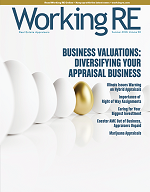 |
“One of the best courses that I have had in 17 years!” -Amy H.
|
Illinois Board Issues Warning on Hybrid Appraisals
by Isaac Peck, Editor
Ever since hybrid appraisals entered the national discussion in the appraisal industry, software companies, legal analysts and appraisers have been wondering how state appraisal boards would interpret the USPAP issues surrounding such assignments. Now we know.
To recap, a hybrid appraisal is a valuation much like a desktop appraisal in that it has a shorter appraisal form and is performed by an appraiser who typically never visits the property, but is distinct in that it requires the appraiser to rely on information provided by an unlicensed third party inspector who observes, photographs and reports on the exterior and/ or interior of the subject property.
While most state boards have remained silent on the issue, the February 2019 issue of Illinois Appraiser, published by the Illinois Department of Financial and Professional Regulation (IDFPR), provides one of the first insights into how state boards interpret this issue. Brian Weaver, Appraisal Coordinator of the IDFPR and editor of Illinois Appraiser, points out that the concept of a third party providing assistance on an appraisal assignment is not new. “Back in the 1970s and 1980s there were plenty of appraisers who used somebody else to do the sketch, take the pictures or pull comps. The appraiser put all of the pieces together and signed the report. Then came USPAP in 1989. Licensing followed shortly thereafter,” writes Weaver. The issue today, Weaver explains, is how to handle assignments where an unlicensed third party reports to the licensed appraiser about the quality and/or condition of a supposedly fully inspected subject property.
Responsibility and Data
Weaver makes it clear that it is wholly the appraiser’s responsibility to determine if the information provided by the third party is reliable and adequate. “AMCs and lenders who create proprietary forms for hybrids are careful to craft an elusive SOW (Scope of Work) that boxes the appraiser in and places the responsibility for selecting reliable information squarely on the appraiser…not the ‘inspector.’ The third party inspection starts out and ends up as additional risk to the credential holder,” explains Weaver.
(story continues below)

(story continues)
Warning for Appraisers and AMCs
There is also the question of what kinds of data the unlicensed third party can provide to the appraiser before it rises to the level of Significant Appraisal Assistance— which requires a licensed appraiser. While USPAP does not define what constitutes Significant Appraisal Assistance, in FAQ 247, TAF writes: “the reference to the term appraisal assistance means that the contribution is related to the appraisal process or requires appraiser competency.”
So what kind of assistance can an unlicensed inspector provide? Weaver says photographs are ok, but they may not provide information on Improvement Quality, Improvement Condition, Room Count, and Improvement Size/Square Footage. Weaver asks how unlicensed third parties can provide room count or square footage if appraisers themselves can’t even agree on room counts (attics, add-ons, three-season rooms) or “come together on how to properly measure a structure?”
In short, “filtered data needs to come from a licensed appraiser,” Weaver warns.
Weaver reminds appraisal management companies (AMCs) that AMCs registered in Illinois sign a certification that they will “utilize Illinois licensed appraisers to provide appraisal services within the State of Illinois” (Sec. 225 ILCS 459/40). “If it is clear that unlicensed inspectors are providing filtered data to appraisers…then AMCs have breached this section of the Act and are subject to enforcement action. In its simplest terms, third party ‘inspectors’ can tell an appraiser what they see, not provide their opinion of what they see. In short, we’re not telling anyone not to provide hybrid reports; we’re just spelling out the consequences,” warns Weaver.
Appraisal Foundation Position
While Weaver and the IFDPR appear to be warning appraisers and AMCs about the potential for some hybrid appraisal assignments to violate USPAP, hybrid appraisals are not, as a rule, forbidden by USPAP.
The Appraisal Foundation (TAF) has issued a number of FAQs and statements regarding hybrid appraisals within the last year, including a recent Q&A video featuring John Brennan, Director of Appraisal Issues at TAF. Brennan states unequivocally that USPAP does allow for hybrid appraisal assignments. “There is no requirement in USPAP for the appraiser to physically inspect the property. Standards Rule 1-2e is what requires appraisers to identify the characteristics of the property, and an appraiser can use a lot of different resources to do that. They can use a combination of property inspection plans, specifications, public records, engineering reports, photos, etc., to gather information about the relevant characteristics of the subject property. It is not required that they do the inspection,” says Brennan.
Ultimately, the appraiser is taking full responsibility for the entire contents of the appraisal report regardless of whether they do the inspection or not. “If the appraiser does not do the inspection, the appraiser has to have a reasonable basis to believe that the information being provided by the client, in this case the inspection performed by someone else, is reliable and credible,” warns Brennan. “The appraiser can’t allow the assignment conditions to limit the scope of work to such a degree that the assignment results are not credible. If the only way to perform a credible analysis is to inspect the property, the appraiser either needs to contact the client to change the scope of work or withdraw from the assignment.”
(story continues below)

(story continues)
In terms of whether the appraiser needs to disclose the assistance of this unlicensed third party, Brennan says that if the information being provided in the inspection only includes factual data about subject property, that is not Significant Appraisal Assistance.
In terms of what a “fact” means, Brennan differs from Weaver, categorizing the “number of bedrooms” as a fact, not an opinion. “If they’re just reporting the number of bedrooms or the number of car garages, or the age of the property, those are facts, which don’t rise to the level of Significant Appraisal Assistance,” says Brennan.
However, Brennan says that if the appraiser relies on “opinions and conclusions of the inspector” regarding things like quality, condition, and functional utility, then that rises to the level of significant professional assistance and does require a licensed appraiser.
“In this case, you would have to disclose the identity of the person providing that assistance, if, and only if, that person is an appraiser. If the person is not an appraiser, they do not need to be identified in the appraisal assignment,” reports Brennan. According to Brennan, the Appraisal Standards Board (ASB) is currently considering whether to change USPAP to require identification of non-appraisers who provide assistance in the report.
Analysis
Craig Capilla, an Illinois trial lawyer with the Franklin Law Group who concentrates in real estate appraiser cases, warned appraisers in 2018 about state disciplinary complaints from the IDFPR (See Navigating Hybrid Appraisals). Capilla says that the Illinois Appraiser newsletter offers important takeaways for both appraisers and AMCs. “For the individual appraiser, it is important for them to understand that they are ultimately responsible for any data they include and choose to rely on in an appraisal report. If an appraiser is uncertain of the accuracy of the data provided to them, they must either verify that the data is correct or they may not rely upon that data. A client cannot insist that an appraiser rely on data that the appraiser does not reasonably believe to be accurate,” says Capilla.
In terms of the IDFPR’s position in particular, Capilla points out that it appears more restrictive than the guidance issued by TAF and emphasizes that such interpretations will likely vary by state and jurisdiction. “It is clear that IDFPR considers any analysis of the subject property, including room count and property measurements, to be appraisal services which must be performed by a licensed professional. This interpretation does not line up exactly with statements published by TAF and may not be the same in every other state or jurisdiction, but it is something that might be tested based on the language specific to the licensing statute in Illinois. States have the authority to take positions that are more rigid than the minimum standards enacted by the TAF and so it is important for appraisers and AMCs to know what the applicable laws and rules are in any state where they practice,” Capilla says.
Finally, the IDFPR makes it abundantly clear that it will actively enforce its interpretation of appraisal services. “The IDFPR is putting AMCs on notice that they may be subject to enforcement action for ordering hybrid/bifurcated appraisal assignments if ‘filtered data’ is being provided by an unlicensed individual,” says Capilla. “Based on the interpretation offered by IDFPR, AMCs may be opening themselves up to regulatory enforcement actions if they are ordering hybrid/bifurcated assignments and they are utilizing unlicensed third party property inspectors. The amount and type of data being provided by the inspector will be the determining factor here,” Capilla said.
About the Author
Isaac Peck is the Editor of Working RE magazine and the Vice President of Marketing and Operations at OREP.org, a leading provider of E&O insurance for appraisers, inspectors and other real estate professionals in 50 states. He received his master’s degree in accounting at San Diego State University. He can be contacted at isaac@orep.org or (888) 347-5273.
CE Online – 7 Hours (AQB Approved)
Identifying and Correcting Persistent Appraisal Failures
Richard Hagar, SRA, is an educator, author and owner of a busy appraisal office in the state of Washington. Hagar now offers his legendary adjustments course for CE credit in over
40 states through OREPEducation.org. The new 7-hour online CE course Identifying and Correcting Persistent Appraisal Failures shows appraisers how to avoid CU’s red flags, minimize callbacks, save time, and earn more! Learn how to improve the quality of your reports and build defensible reports! OREP insureds save on this approved coursework. Sign up today at
www.OREPEducation.org.
Sign Up Now! $119 (7 Hrs)
OREP
Insured’s Price: $99
>Opt-In to Working RE Newsletters
>Shop Appraiser Insurance
>Shop Real Estate Agent
Insurance
Send your story submission/idea to the Editor:
isaac@orep.org



by Linda Libbey
does it not seem strange that an appraiser must take the comparable photos, but anyone can inspect the subject and take those photos??
-by Michael Ford, AGA, SCGREA, GAA, RAA, Realtor®
50 states and 7 different territories already have 57 interpretations of USPAP. Despite TAFs prior notice (AO) that late report delivery is NOT a USPAP violation, Montana State Regulators screening review appraisers think it is.
Throw in what is at best a very gray & ambiguous area of compliance and a strong probability of selective parsing and sophist reports, and hybrids just aren’t worth the risk.
Even assuming we all wanted to see how we can fast track ourselves into oblivion as a profession.
I repeat my challenge again to any appraiser of huckster promoters of hybrids; in America-redact your name and post JUST ONE hybrid completed in under an hour using third party property inspectors.
So far NOT ONE purveyor of these has been able to provide a USPAP compliant report copy. Not one. Not Mueller. Not Class, Not ClearVal-not one.
-by C. Ragle
If measuring a house and determining total gross living area is “filtered data”, appraisers can not possibly allow a third party to measure the subject. I just don’t understand why any appraisers would risk their license by doing these bifurcated assignments.
-by Candy
I guess we won’t have to take USPAP anymore, if these become the norm. I think USPAP
-has several paragraphs about “significant appraisal assistance”. What if the property inspector tells me it has “public water” and it ends up being a “well” or visa-versa. Well vs. public water is something I typically adjust for certain markets. Now, I have a erroneous $5,000 adjustment. Go figure.
by Jeanne GiordanoSmith
I can think of no other professionals who get pushed around like this. I think
-appraisers should band together and quietly refuse to complete these assignments, which are of no benefit to anyone.
by John Welter
Ever heard the expression “The left hand doesn’t know what the right hand is doing?” That’s the way I view the bifurcated appraisal. Liability? Watch the E & O rates go way up. Has everyone lost their mind? The disconnect will be vast that accuracy will certainly suffer.
-by Rachel Massey
Thank you for this informative piece
-by James Scholl
When Illinois says the inspector must be licensed do they mean appraisal license or will a real estate agent be sufficient? The new New York AMC law seems to suggest only an appraiser can do the appraisal inspection. I wonder how the state will interpret hybrids?
-by Chuck Minzenberger
Realtors and Appraisers get a ‘pass’ on the ‘inspector’ license, but must put in the property disclosure, make sure you are including “standards of practice” as defined in the Home Inspector License Act [225 ILCS 441] and 68 Ill. Adm. Code 1410 disclosure stuff in your reports
-by GERARD C RECORD
Are these the same lenders who wouldn’t accept licensed assistant appraisers (with 120 hrs of training) who were supervised by Certified Appraisers? Sad what ends some will go to for a penny wise savings, not to mention the lag time involved.
-by BP Jones
Any appraiser agreeing to perform a hybrid appraisal is undercutting their own business and selling out their own license. Lenders and AMCs are profiting on an appraiser’s signature by paying minimum fees and placing all of the liability squarely on the appraiser for signing off on third-party information. I don’t recall the comedian, but “you can’t fix stupid” certainly applies to appraisers pursuing this shoddy product to make a few bucks.
-by James Scholl
BP that was Ron White’ s tag line.
-